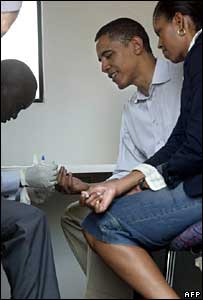
"Now, we talk about reducing the stigma of this disease -- yet we've treated a visitor living with it as a threat," he said at the signing ceremony of the Ryan White HIV/AIDS Treatment Extension Act.
"If we want to be the global leader in combating HIV/AIDS, we need to act like it. And that's why on Monday, my administration will publish a final rule that eliminates the travel ban effective just after the New Year," Obama said.
Obama's predecessor George W. Bush signed legislation last year that removed HIV from a list of diseases "of public health significance" that effectively barred any person infected with HIV from entering the United States.
But the law was not implemented by the US Department of Health and Human Services, which regulates US immigration authorities in some instances.
Human rights and HIV/AIDS activism groups hailed the end of the controversial ban, saying it would put the US back in a leadership role in the fight against the illness and would help to lift the stigma associated with AIDS.
"We applaud President Obama for working to reduce the stigma of HIV/AIDS by announcing this important policy change and reminding us of the voice a young man named Ryan White who was living with HIV and wanted to go to school," Rebecca Haag, director of the AIDS Action Council, said.
The Ryan White bill, which was first passed 19 years ago, is named after a 13-year-old boy who contracted HIV during a blood transfusion in 1984 -- a time when the virus was first becoming known and was hugely misunderstood.
His family was forced to move from the town in Indiana where they lived after some parents protested when he continued to show up for class, with some pulling their own children out of the school.
Physicians for Human Rights hailed the lifting of the ban, which it said had "made the United States a pariah in human rights circles, and harmed our reputation as a world leader of HIV/AIDS prevention, treatment and care."
The HIV Medicine Association (HIVMA) bade the ban "good riddance," saying the "discriminatory rule... had no basis in public health or sound science.
"This long-overdue move brings the US in line with current scientific and international standards of public health and will lessen the painful stigma and discrimination suffered by HIV-positive people," HIVMA chairwoman Arlene Bardeguez said in a statement.
The ban on HIV-positive foreigners entering the United States had been in place since 1987 -- three years before Ryan White died and the law that now bears his name was first passed.
Obama made the announcement in the US capital, where three percent of all residents over the age of 12 have HIV or full-blown AIDS.
The United Nations' HIV/AIDS agency and the US Centers for Disease Control and Prevention (CDC) have said HIV is "generalized and severe" when one percent of a given population is infected.
Some 1.1 million people in the United States are believed to have HIV, according to the CDC.
-----------------------------------------------------------------------------------------------------------------------------------
"If we want to be the global leader in combating HIV/AIDS, we need to act like it. And that's why on Monday, my administration will publish a final rule that eliminates the travel ban effective just after the New Year," Obama said.
Obama's predecessor George W. Bush signed legislation last year that removed HIV from a list of diseases "of public health significance" that effectively barred any person infected with HIV from entering the United States.
But the law was not implemented by the US Department of Health and Human Services, which regulates US immigration authorities in some instances.
Human rights and HIV/AIDS activism groups hailed the end of the controversial ban, saying it would put the US back in a leadership role in the fight against the illness and would help to lift the stigma associated with AIDS.
"We applaud President Obama for working to reduce the stigma of HIV/AIDS by announcing this important policy change and reminding us of the voice a young man named Ryan White who was living with HIV and wanted to go to school," Rebecca Haag, director of the AIDS Action Council, said.
The Ryan White bill, which was first passed 19 years ago, is named after a 13-year-old boy who contracted HIV during a blood transfusion in 1984 -- a time when the virus was first becoming known and was hugely misunderstood.
His family was forced to move from the town in Indiana where they lived after some parents protested when he continued to show up for class, with some pulling their own children out of the school.
Physicians for Human Rights hailed the lifting of the ban, which it said had "made the United States a pariah in human rights circles, and harmed our reputation as a world leader of HIV/AIDS prevention, treatment and care."
The HIV Medicine Association (HIVMA) bade the ban "good riddance," saying the "discriminatory rule... had no basis in public health or sound science.
"This long-overdue move brings the US in line with current scientific and international standards of public health and will lessen the painful stigma and discrimination suffered by HIV-positive people," HIVMA chairwoman Arlene Bardeguez said in a statement.
The ban on HIV-positive foreigners entering the United States had been in place since 1987 -- three years before Ryan White died and the law that now bears his name was first passed.
Obama made the announcement in the US capital, where three percent of all residents over the age of 12 have HIV or full-blown AIDS.
The United Nations' HIV/AIDS agency and the US Centers for Disease Control and Prevention (CDC) have said HIV is "generalized and severe" when one percent of a given population is infected.
Some 1.1 million people in the United States are believed to have HIV, according to the CDC.
-----------------------------------------------------------------------------------------------------------------------------------









 Home
Home Politics
Politics









